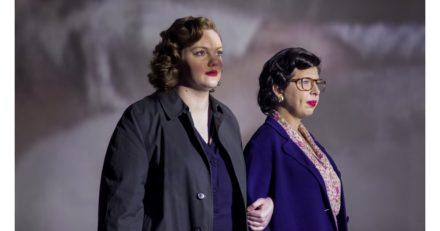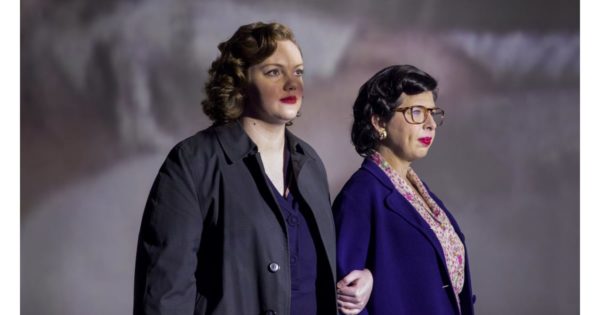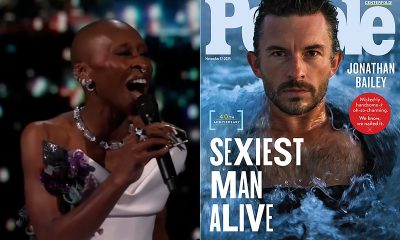Arts & Entertainment
For Heather Matarazzo, ‘Equal’ is still a cause worth fighting for


The HBO Max docuseries, “Equal,” which debuts this week, is designed to shore up our education by profiling various pioneers in a movement for LGBTQ equality that might never have happened if not for their refusal to stay invisible. It’s “infotainment” in the best sense of that term, blending real-life archival footage with newly filmed “re-enactments” to deliver a concise overview of pre-Stonewall history.
That means in addition to giving us a queer history lesson, “Equal” also gives us a host of queer actors paying homage to their forebears by standing in for them in the newly filmed sequences. There’s a long list: Cheyenne Jackson and Anthony Rapp (Dale Jennings and Harry Hay), Jamie Clayton (Christine Jorgensen), Samira Wiley (Lorraine Hansberry), and Hailie Sahar of “Pose” (Sylvia Rivera) are some of the better known – but among these familiar faces is also someone who is something of an icon in her own right.
Heather Matarazzo’s breakthrough performance at 13 as middle school outcast Dawn Weiner in Todd Solondz’s 1995 counter-culture classic, “Welcome to the Dollhouse,” made her a touchstone for a whole generation of traumatized teenagers. Later, she won a new flock of fans as BFF Lilly in “The Princess Diaries” movies, as well.
Now, she is appearing in “Equal” as Phyllis Lyon – who with partner Del Martin (played by Shannon Purser) co-founded the Daughters of Bilitis in 1955. The pair went on to become the first LGBTQ couple married in San Francisco in 2008.
Playing Lyon seems a natural fit for Matarazzo, given her own history as a vocal advocate for feminist and LGBTQ social justice issues, which were still very much on her mind as she spoke with the Blade last week about her participation in “Equal.”
Our conversation is below.
BLADE: How did you feel about playing Phyllis? Was there a sense of personal connection?
HEATHER MATARAZZO: It’s such an interesting question, right? Because history is history is history and so on, and so it goes. I got to feel safe enough to come out thanks to those who came before me, and put their bodies and their reputations on the line, in order for me to say, “Yes, I’m a lesbian,” and be able to say that publicly. I mean, really, I came out because I clearly didn’t have any other choice. It was so spontaneous, and it was so honest, and it was in the moment – and yet, within that, I get to look at those that came before me, in one way or another, and I get to see how their bravery allows me to be brave, too.
BLADE: And now you get to be that for others.
MATARAZZO: I do my best to receive any praise that I’m given, especially by those who say that my coming out helped enable them to come out – especially people that are younger than me, that knew me from “Princess Diaries” and whatnot, and then were like, “Oh my god, Lilly’s a LESBIAN?” I receive it as best as I can, because at the end of the day – and I say this in the most grounded of ways – we really, truly are all lights for each other.
BLADE: Like links in a chain.
MATARAZZO: Yeah, exactly. It’s a collective.
BLADE: What was your takeaway from playing Phyllis?
MATARAZZO: I think both she and Del were wonderful women who really stuck their necks out in order to build a safe community of lesbians. I was just talking about this with my wife the other night, about pre-Stonewall, and the risks that were continually taken in order for us, as members of the LGBTQ community, to be able to organize and meet with each other, in order to have a semblance of “normalcy.”
That’s what I love about Phyllis and Del, their ability, seemingly, to exhibit defiant joy. There’s a lot of joy that I see in their interviews together, about their story, how they met, the sneaking around… it almost becomes like a “Great Muppet Caper.” You know? Where it’s “We’re gonna do whatever it is we have to do to get to wherever it is we desire to be.” And I’m grateful that they both got to have that full experience before they passed, unlike so many that didn’t get it, or haven’t gotten it yet.
BLADE: Do you think it’s important to tell their stories for a generation that maybe doesn’t have it as hard?
MATARAZZO: The older I’ve gotten, on one hand it doesn’t seem like being out is that big of a deal anymore – and yet, even as I say that, we are looking at the fucking clown show that is this Supreme Court nomination process.
Let’s be clear, the United States is abysmal in its human rights practices. That’s not something that went away when we got marriage equality. I mean, look at all of the Black trans women that have been murdered here, this year alone? And I don’t think that we can talk about sexual orientation without also talking about race, without also talking about gender – there are so many different intersections, because when you talk about one, you can’t NOT talk about the other.
We all desire to be seen, and held, in our humanity. And we shouldn’t have to spend so much time fighting for our humanity and our fucking right to exist. Every single person deserves to feel safe, and not fear for their lives simply based upon one’s sexual orientation, or the color of one’s skin, or one’s religion, or one’s gender identity, or one’s – there are so many things. So, for me, it’s all so connected, it’s a microcosmic experience of something much larger.
BLADE: That ties in with your first-hand experience with sexism in Hollywood. You spoke up in support of Rose Byrne when she helped bring #MeToo and the Harvey Weinstein scandal into the spotlight. What would you say about that subject now?
MATARAZZO: I’m glad Weinstein’s in jail. I hope he stays there, and I hope he rots.
Here’s the thing, we still have a long way to go. Because again, MeToo was pretty much cis-gender, hetero white ladies speaking out about it, and so, you know, it’s synonymous now with cis-gender, hetero fucking white ladies – when the movement was founded by fucking Tarana Burke. And when you have 63 percent of white women voting for a fucking person who literally said, “I grab women by their pussies?” I mean, I think that white women just need to shut the fuck up, and finally listen to black women, for once.
Right now, the truth is that we are living in precarious times – we always have been, to one degree or another, depending on where you are in the disparity that is this American caste system.
BLADE: Do you hope that the current resurgence of the equality movement will help bring about change in those who oppose it?
MATARAZZO: Sure. Or, we could just leave them by the wayside.
Books
Love or fear flying you’ll devour ‘Why Fly’
New book chronicles a lifetime obsession with aircraft

‘Why Fly’
By Caroline Paul
c. 2026, Bloomsbury
$27.99/256 pages
Tray table folded up.
Check. Your seat is in the upright position, the airflow above your head is just the way you like it, and you’re ready to go. The flight crew is making final preparations. The lights are off and the plane is backing up. All you need now is “Why Fly” by Caroline Paul, and buckle up.

When she was very young, Paul was “obsessed” with tales of adventure, devouring accounts written by men of their derring-do. The only female adventure-seeker she knew about then was Amelia Earhart; later, she learned of other adventuresome women, including aviatrix Bessie Coleman, and Paul was transfixed.
Time passed; Paul grew up to create a life of adventure all her own.
Then, the year her marriage started to fracture, she switched her obsession from general exploits to flight.
Specifically, Paul loves experimental aircraft, some of which, like her “trike,” can be made from a kit at home. Others, like Woodstock, her beloved yellow gyrocopter, are major purchases that operate under different FAA rules. All flying has rules, she says, even if it seems like it should be as freewheeling as the birds it mimics.
She loves the pre-flight checklist, which is pure anticipation as well as a series of safety measures; if only a relationship had the same ritual. Paul loves her hangar, as a place of comfort and for flight in all senses of the word. She enjoys thinking about historic tales of flying, going back before the Wright Brothers, and including a man who went aloft on a lawn chair via helium-filled weather balloons.
The mere idea that she can fly any time is like a gift to Paul.
She knows a lot of people are terrified of flying, but it’s near totally safe: generally, there’s a one in almost 14 million chance of perishing in a commercial airline disaster – although, to Paul’s embarrassment and her dismay, it’s possible that both the smallest planes and the grandest loves might crash.
If you’re a fan of flying, you know what to do here. If you fear it, pry your fingernails off the armrests, take a deep breath, and head to the shelves. “Why Fly” might help you change your mind.
It’s not just that author Caroline Paul enjoys being airborne, and she tells you. It’s not that she’s honest in her explanations of being in love and being aloft. It’s the meditative aura you’ll get as you’re reading this book that makes it so appealing, despite the sometimes technical information that may flummox you between the Zen-ness. It’s not overwhelming; it mixes well with the history Paul includes, biographies, the science, heartbreak, and exciting tales of adventure and risk, but it’s there. Readers and romantics who love the outdoors, can’t resist a good mountain, and crave activity won’t mind it, though, not at all.
If you own a plane – or want to – you’ll want this book, too. It’s a great waiting-at-the-airport tale, or a tuck-in-your-suitcase-for-later read. Find “Why Fly” and you’ll see that it’s an upright kind of book.
The Blade may receive commissions from qualifying purchases made via this post.
Theater
Out actor Kevin Cahoon on starring role in ‘Chez Joey’
Arena production adapted from Broadway classic ‘Pal Joey’

‘Chez Joey’
Through March 15
Arena Stage
1101 Sixth St., S.W.
Tickets start at $93
Arenastage.org
As Melvin Snyder in the new musical “Chez Joey,” out actor Kevin Cahoon plays a showbiz society columnist who goes by the name Mrs. Knickerbocker. He functions as a sort of liaison between café society and Chicago’s Black jazz scene circa 1940s. It’s a fun part replete with varied insights, music, and dance.
“Chez Joey” is adapted from the Broadway classic “Pal Joey” by Richard Rodgers and Lorenz Hart. It’s inspired by John O’Hara’s stories based on the exploits of a small-time nightclub singer published in The New Yorker.
A warm and humorous man, Cahoon loves his work. At just six, he began his career as a rodeo clown in Houston. He won the Star Search teen division at 13 singing songs like “Some People” from “Gypsy.” He studied theater at New York University and soon after graduating set to work playing sidekicks and comedic roles.
Over the years, Cahoon has played numerous queer parts in stage productions including “Hedwig and the Angry Inch,” “La Cage aux Folles,” “Rocky Horror” as well as Peanut in “Shucked,” and George the keyboardist in “The Wedding Singer,” “a sort of unicorn of its time,” says Cahoon.
Co-directed by Tony Goldwyn and the great Savion Glover, “Chez Joey” is a terrific and fun show filled with loads of talent. Its relevant new book is by Richard Lagravenese.
On a recent Monday off from work, Cahoon shared some thoughts on past and current happenings.
WASHINGTON BLADE: Is there a through line from Kevin, the six-year-old rodeo clown, to who we see now at Arena Stage?
KEVIN CAHOON: Anytime I want to land a joke in a theater piece it goes back to that rodeo clown. It doesn’t matter if it’s Arena’s intimate Kreeger Theatre or the big rodeo at the huge Houston Astrodome.
I was in the middle stadium and there was an announcer — a scene partner really. And we were doing a back and forth in hopes of getting laughs. At that young age I was trying to understand what it takes to get laughs. It’s all about timing. Every line.
BLADE: Originally, your part in “Chez Joey” Melvin was Melba who sings “Zip,” a clever woman reporter’s song. It was sort of a star feature, where they could just pop in a star in the run of “Pal Joey.”
CAHOON: That’s right. And in former versions it was played by Martha Plimpton and before her Elaine Stritch. For “Chez Joey,” we switched gender and storyline.
We attempted to do “Zip” up until two days before we had an audience at Arena. Unexpectedly they cut “Zip” and replaced it with a fun number called “I Like to Recognize the Tune,” a song more connected to the story.
BLADE: Wow. You must be a quick study.
CAHOON: Well, we’re working with a great band.
BLADE: You’ve played a lot of queer parts. Any thoughts on queer representation?
CAHOON: Oh yes, definitely. And I’ve been very lucky that I’ve had the chance to portray these characters and introduce them to the rest of the world. I feel honored.
After originating Edna, the hyena on Broadway in “The Lion King,” I left that to do “Hedwig and the Angry Inch” as standby for John Cameron Mitchell, doing one show a week for him.
Everyone thought I was crazy to leave the biggest musical of our time with a personal contract and getting paid more money that I’d ever made to get $400 a week at the downtown Jane Street Theatre in a dicey neighborhood.
At the time, I really felt like I was with cool kids. I guess I was. And I never regretted it.
BLADE: When you play new parts, do you create new backstories for the role?
CAHOON: Every single time! For Melvin, I suggested a line about chorus boys on Lakeshore Drive.
BLADE: What’s up next for Kevin Cahoon?
CAHOON: I’m about to do the New York Theatre Workshop Gala; I’ve been doing it for nine years in a row. It’s a huge job. I’ll also be producing the “Cats: The Jellicle Ball” opening on Broadway this spring; it’s a queer-centric uptown vogue ball with gay actor André de Shields reprising his role as “Old Deuteronomy.”
BLADE: There’s a huge amount of talent onstage in “Chez Joey.”
CAHOON: There is. I’m sharing a dressing room with Myles Frost who plays Joey. He won accolades for playing Michael Jackson on Broadway. We’ve become great friends. He’s a miracle to watch on stage. And Awa [Sal Secka], a D.C. local, is great. Every night the audience falls head over heels for her. When this show goes to New York, Awa will, no doubt, be a giant star.
BLADE: Do you think “Chez Joey” might be Broadway bound?
CAHOON: I have a good feeling it is. I’ve done shows out of town that have high hopes and pedigree, but don’t necessarily make it. “Chez Joey” is a small production, it’s funny, and audiences seem to love it.

The Capital Pride Alliance held the annual Pride Reveal event at The Schuyler at The Hamilton Hotel on Thursday, Feb. 26. The theme for this year’s Capital Pride was announced: “Exist. Resist. Have the audacity!”
(Washington Blade photos by Michael Key)









































